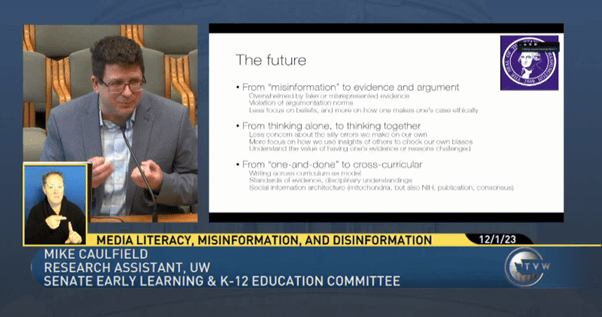By Michael Grass
During a Washington Senate Early Learning & K–12 Education Committee work session presentation in Olympia on December 1, University of Washington Center for an Informed Public co-founder Jevin West and CIP research scientist Mike Caulfield discussed ways educators should approach the teaching of media literacy skills amid today’s volatile and rapidly evolving online information environments.
“This topic of media literacy and digital citizenship needs to be integrated across all subjects” not only across traditional K–12 education and higher ed, but also for older adults trying to navigate information spaces online, West said.
In his remarks about the future of media literacy education, Caulfield noted that teachers, librarians and other educators thinking through lessons about “misinformation” should instead consider shifting their focus to evidence and argument. That approach, Caulfield said, shifts away from complex issues around belief and more toward teaching students how to construct and make an argument ethically.
“If we lose the standards for evidence, we all lose,” said Caulfield, the co-author of the recently released book, Verified: How to Think Straight, Get Duped Less, and Make Better Decisions About What to Believe Online, who developed the highly regarded SIFT method for factchecking and contextualizing claims online.
During their presentation, Caulfield and West answered questions from Washington State Sens. Lisa Wellman of Mercer Island, who chairs the committee, and Claire Wilson of Federal Way.
Responding to a question from Wilson about the importance of multigenerational educational opportunities around information and media literacy skills, Caulfield pointed to the CIP’s work fostering opportunities for students to teach their parents and other adults in their lives about navigating online environments, including through MisinfoNight educational events in high schools.
“They have parents come to them and they’re showing parents how they can use their phones” to factcheck and contextualize content online, he said. “I’ve gone to these events and I’ve been impressed that the students in this particular situation, they’re better teachers than I ever would be.”
Caulfield noted that by teaching these vital skills, they reinforce an important purpose of education so that “when you come into the public sphere and you try to advance your belief,” he said, “that you know where the evidence you’re presenting came from” and “that you understand what the counterarguments are. That’s not just to preserve democratic discourse, but also to empower you to make your case that is most effective.”
The presentation by Caulfield and West is in the final 30 minutes of the committee’s December 1 meeting recording, available on TVW.
Michael Grass is the CIP’s assistant director for communications.




